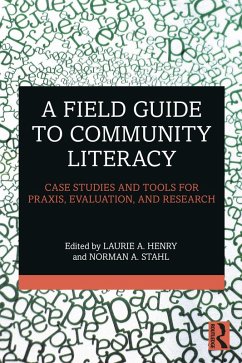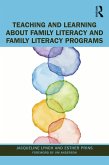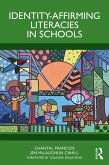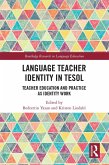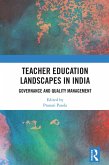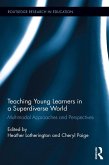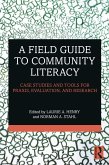A Field Guide to Community Literacy (eBook, PDF)
Case Studies and Tools for Praxis, Evaluation, and Research
Redaktion: Henry, Laurie A.; Stahl, Norman A.
31,95 €
31,95 €
inkl. MwSt.
Sofort per Download lieferbar

16 °P sammeln
31,95 €
Als Download kaufen

31,95 €
inkl. MwSt.
Sofort per Download lieferbar

16 °P sammeln
Jetzt verschenken
Alle Infos zum eBook verschenken
31,95 €
inkl. MwSt.
Sofort per Download lieferbar
Alle Infos zum eBook verschenken

16 °P sammeln
A Field Guide to Community Literacy (eBook, PDF)
Case Studies and Tools for Praxis, Evaluation, and Research
Redaktion: Henry, Laurie A.; Stahl, Norman A.
- Format: PDF
- Merkliste
- Auf die Merkliste
- Bewerten Bewerten
- Teilen
- Produkt teilen
- Produkterinnerung
- Produkterinnerung

Bitte loggen Sie sich zunächst in Ihr Kundenkonto ein oder registrieren Sie sich bei
bücher.de, um das eBook-Abo tolino select nutzen zu können.
Hier können Sie sich einloggen
Hier können Sie sich einloggen
Sie sind bereits eingeloggt. Klicken Sie auf 2. tolino select Abo, um fortzufahren.

Bitte loggen Sie sich zunächst in Ihr Kundenkonto ein oder registrieren Sie sich bei bücher.de, um das eBook-Abo tolino select nutzen zu können.
This guidebook presents trends, research-grounded strategies, and field-based solutions to challenges of working in community-based literacy initiatives. A comprehensive guide for practitioners, this book addresses best practices for implementing, maintaining, expanding, and evaluating community-based literacy initiatives.
- Geräte: PC
- ohne Kopierschutz
- eBook Hilfe
- Größe: 9.67MB
Andere Kunden interessierten sich auch für
![Teaching and Learning about Family Literacy and Family Literacy Programs (eBook, PDF) Teaching and Learning about Family Literacy and Family Literacy Programs (eBook, PDF)]() Jacqueline LynchTeaching and Learning about Family Literacy and Family Literacy Programs (eBook, PDF)40,95 €
Jacqueline LynchTeaching and Learning about Family Literacy and Family Literacy Programs (eBook, PDF)40,95 €![Identity-Affirming Literacies in Schools (eBook, PDF) Identity-Affirming Literacies in Schools (eBook, PDF)]() Chantal FrancoisIdentity-Affirming Literacies in Schools (eBook, PDF)41,95 €
Chantal FrancoisIdentity-Affirming Literacies in Schools (eBook, PDF)41,95 €![Language Teacher Identity in TESOL (eBook, PDF) Language Teacher Identity in TESOL (eBook, PDF)]() Language Teacher Identity in TESOL (eBook, PDF)41,95 €
Language Teacher Identity in TESOL (eBook, PDF)41,95 €![Teacher Education Landscapes in India (eBook, PDF) Teacher Education Landscapes in India (eBook, PDF)]() Teacher Education Landscapes in India (eBook, PDF)41,95 €
Teacher Education Landscapes in India (eBook, PDF)41,95 €![Teaching Young Learners in a Superdiverse World (eBook, PDF) Teaching Young Learners in a Superdiverse World (eBook, PDF)]() Teaching Young Learners in a Superdiverse World (eBook, PDF)30,95 €
Teaching Young Learners in a Superdiverse World (eBook, PDF)30,95 €![A Field Guide to Community Literacy (eBook, ePUB) A Field Guide to Community Literacy (eBook, ePUB)]() A Field Guide to Community Literacy (eBook, ePUB)31,95 €
A Field Guide to Community Literacy (eBook, ePUB)31,95 €![Teacher Education (eBook, PDF) Teacher Education (eBook, PDF)]() Teacher Education (eBook, PDF)41,95 €
Teacher Education (eBook, PDF)41,95 €-
-
-
This guidebook presents trends, research-grounded strategies, and field-based solutions to challenges of working in community-based literacy initiatives. A comprehensive guide for practitioners, this book addresses best practices for implementing, maintaining, expanding, and evaluating community-based literacy initiatives.
Dieser Download kann aus rechtlichen Gründen nur mit Rechnungsadresse in A, B, BG, CY, CZ, D, DK, EW, E, FIN, F, GR, HR, H, IRL, I, LT, L, LR, M, NL, PL, P, R, S, SLO, SK ausgeliefert werden.
Produktdetails
- Produktdetails
- Verlag: Taylor & Francis eBooks
- Seitenzahl: 350
- Erscheinungstermin: 27. April 2022
- Englisch
- ISBN-13: 9781000573428
- Artikelnr.: 63907591
- Verlag: Taylor & Francis eBooks
- Seitenzahl: 350
- Erscheinungstermin: 27. April 2022
- Englisch
- ISBN-13: 9781000573428
- Artikelnr.: 63907591
- Herstellerkennzeichnung Die Herstellerinformationen sind derzeit nicht verfügbar.
Laurie A. Henry is Professor of Literacy at Salisbury University, USA, and Dean of the Seidel School of Education. Norman A. Stahl is Professor Emeritus of Literacy Education at Northern Illinois University, USA, and President of the Reading Hall of Fame.
Section One: Building Community through Literacy
Chapter 1: Adult Literacy Education and the Work of Community Building
Erik Jacobson
Chapter 2: The Community as Educator: Historical and Contemporary Responses
by Economically, Culturally, and Linguistically Marginalized Communities to
the Colonization of Literacy in Education
Ann Bennett
Chapter 3: Family Engagement: Results that Matter
Kim Jacobs, Joshua Cramer, Wendee Mullikin, & Laura Westberg
Chapter 4: Unsettling Community and University: Finding Fluidity in
Community Literacies and the Academy
Gemma Cooper-Novack & Brice Nordquist
Section Two: Setting the Stage for Program Design
Chapter 5: The Community Literacy Audit: Evaluating Community Literacy
Needs to Ensure Equitable Literacy Education
Ann Bennett
Chapter 6: Conducting a Community Literacy Audit
Tara Wilson
Chapter 7: Urban Literacy Education as a Vehicle for Social Change: A
Community Audit of Charlotte, North Carolina
Candace Chambers & Annette Teasdell
Chapter 8: From Idea to Reality: Creating and Implementing an Early
Literacy Action Plan with Community Partners
Terry S. Atkinson, Kimberly L. Anderson, & Elizabeth A. Swaggerty
Chapter 9: Understanding the Psychology of Getting Funded
Beverly Browning
Section Three: Case Studies from the Field
Chapter 10: More than Contaminated Water: Flint, Michigan's Community-Wide
Efforts for Literacy
Chad Waldron
Chapter 11: Leveraging Tutoring Center Literacy
Katherine Marsh
Chapter 12: The Chinatown Youth Organizing Project (CYOP): Community
Literacies for Social Justice Mary Yee
Chapter 13: Health Literacy in a Diabetes Education Center
Megan Hughes
Chapter 14: Little Free Libraries: Fostering Access to Reading Materials
while Developing Community Ties Peggy Semingson & Karabi Bezboruah
Chapter 15: Indigenous-led, Community-based Language Reclamation and
Regeneration Initiatives
M. Kristiina Montero, Spy Dénommé-Welch, & Stanley R. Henry
Chapter 16: Examining the 826 National Model for Scaling Up
Community-School Literacy Partnerships Susan Cridland-Hughes & Mary
Schreuder
Chapter 17: University-based Literacy Clinics
Brian Flores, Amber Meyer, Willian Tignor, & Dixie Massey
Section Four: Evaluating and Researching Community Literacy Programs
Chapter 18: Methods and Models for Literacy Program Evaluations
Vincent Genareo
Chapter 19: Community-based Qualitative Approaches to Studying Literacy
Laura Johnson
Chapter 20: Quantitative Modeling Approaches for Studying Literacy in the
Community
Jan K. Holt & Diana J. Zaleski
Appendices
Chapter 1: Adult Literacy Education and the Work of Community Building
Erik Jacobson
Chapter 2: The Community as Educator: Historical and Contemporary Responses
by Economically, Culturally, and Linguistically Marginalized Communities to
the Colonization of Literacy in Education
Ann Bennett
Chapter 3: Family Engagement: Results that Matter
Kim Jacobs, Joshua Cramer, Wendee Mullikin, & Laura Westberg
Chapter 4: Unsettling Community and University: Finding Fluidity in
Community Literacies and the Academy
Gemma Cooper-Novack & Brice Nordquist
Section Two: Setting the Stage for Program Design
Chapter 5: The Community Literacy Audit: Evaluating Community Literacy
Needs to Ensure Equitable Literacy Education
Ann Bennett
Chapter 6: Conducting a Community Literacy Audit
Tara Wilson
Chapter 7: Urban Literacy Education as a Vehicle for Social Change: A
Community Audit of Charlotte, North Carolina
Candace Chambers & Annette Teasdell
Chapter 8: From Idea to Reality: Creating and Implementing an Early
Literacy Action Plan with Community Partners
Terry S. Atkinson, Kimberly L. Anderson, & Elizabeth A. Swaggerty
Chapter 9: Understanding the Psychology of Getting Funded
Beverly Browning
Section Three: Case Studies from the Field
Chapter 10: More than Contaminated Water: Flint, Michigan's Community-Wide
Efforts for Literacy
Chad Waldron
Chapter 11: Leveraging Tutoring Center Literacy
Katherine Marsh
Chapter 12: The Chinatown Youth Organizing Project (CYOP): Community
Literacies for Social Justice Mary Yee
Chapter 13: Health Literacy in a Diabetes Education Center
Megan Hughes
Chapter 14: Little Free Libraries: Fostering Access to Reading Materials
while Developing Community Ties Peggy Semingson & Karabi Bezboruah
Chapter 15: Indigenous-led, Community-based Language Reclamation and
Regeneration Initiatives
M. Kristiina Montero, Spy Dénommé-Welch, & Stanley R. Henry
Chapter 16: Examining the 826 National Model for Scaling Up
Community-School Literacy Partnerships Susan Cridland-Hughes & Mary
Schreuder
Chapter 17: University-based Literacy Clinics
Brian Flores, Amber Meyer, Willian Tignor, & Dixie Massey
Section Four: Evaluating and Researching Community Literacy Programs
Chapter 18: Methods and Models for Literacy Program Evaluations
Vincent Genareo
Chapter 19: Community-based Qualitative Approaches to Studying Literacy
Laura Johnson
Chapter 20: Quantitative Modeling Approaches for Studying Literacy in the
Community
Jan K. Holt & Diana J. Zaleski
Appendices
Section One: Building Community through Literacy
Chapter 1: Adult Literacy Education and the Work of Community Building
Erik Jacobson
Chapter 2: The Community as Educator: Historical and Contemporary Responses
by Economically, Culturally, and Linguistically Marginalized Communities to
the Colonization of Literacy in Education
Ann Bennett
Chapter 3: Family Engagement: Results that Matter
Kim Jacobs, Joshua Cramer, Wendee Mullikin, & Laura Westberg
Chapter 4: Unsettling Community and University: Finding Fluidity in
Community Literacies and the Academy
Gemma Cooper-Novack & Brice Nordquist
Section Two: Setting the Stage for Program Design
Chapter 5: The Community Literacy Audit: Evaluating Community Literacy
Needs to Ensure Equitable Literacy Education
Ann Bennett
Chapter 6: Conducting a Community Literacy Audit
Tara Wilson
Chapter 7: Urban Literacy Education as a Vehicle for Social Change: A
Community Audit of Charlotte, North Carolina
Candace Chambers & Annette Teasdell
Chapter 8: From Idea to Reality: Creating and Implementing an Early
Literacy Action Plan with Community Partners
Terry S. Atkinson, Kimberly L. Anderson, & Elizabeth A. Swaggerty
Chapter 9: Understanding the Psychology of Getting Funded
Beverly Browning
Section Three: Case Studies from the Field
Chapter 10: More than Contaminated Water: Flint, Michigan's Community-Wide
Efforts for Literacy
Chad Waldron
Chapter 11: Leveraging Tutoring Center Literacy
Katherine Marsh
Chapter 12: The Chinatown Youth Organizing Project (CYOP): Community
Literacies for Social Justice Mary Yee
Chapter 13: Health Literacy in a Diabetes Education Center
Megan Hughes
Chapter 14: Little Free Libraries: Fostering Access to Reading Materials
while Developing Community Ties Peggy Semingson & Karabi Bezboruah
Chapter 15: Indigenous-led, Community-based Language Reclamation and
Regeneration Initiatives
M. Kristiina Montero, Spy Dénommé-Welch, & Stanley R. Henry
Chapter 16: Examining the 826 National Model for Scaling Up
Community-School Literacy Partnerships Susan Cridland-Hughes & Mary
Schreuder
Chapter 17: University-based Literacy Clinics
Brian Flores, Amber Meyer, Willian Tignor, & Dixie Massey
Section Four: Evaluating and Researching Community Literacy Programs
Chapter 18: Methods and Models for Literacy Program Evaluations
Vincent Genareo
Chapter 19: Community-based Qualitative Approaches to Studying Literacy
Laura Johnson
Chapter 20: Quantitative Modeling Approaches for Studying Literacy in the
Community
Jan K. Holt & Diana J. Zaleski
Appendices
Chapter 1: Adult Literacy Education and the Work of Community Building
Erik Jacobson
Chapter 2: The Community as Educator: Historical and Contemporary Responses
by Economically, Culturally, and Linguistically Marginalized Communities to
the Colonization of Literacy in Education
Ann Bennett
Chapter 3: Family Engagement: Results that Matter
Kim Jacobs, Joshua Cramer, Wendee Mullikin, & Laura Westberg
Chapter 4: Unsettling Community and University: Finding Fluidity in
Community Literacies and the Academy
Gemma Cooper-Novack & Brice Nordquist
Section Two: Setting the Stage for Program Design
Chapter 5: The Community Literacy Audit: Evaluating Community Literacy
Needs to Ensure Equitable Literacy Education
Ann Bennett
Chapter 6: Conducting a Community Literacy Audit
Tara Wilson
Chapter 7: Urban Literacy Education as a Vehicle for Social Change: A
Community Audit of Charlotte, North Carolina
Candace Chambers & Annette Teasdell
Chapter 8: From Idea to Reality: Creating and Implementing an Early
Literacy Action Plan with Community Partners
Terry S. Atkinson, Kimberly L. Anderson, & Elizabeth A. Swaggerty
Chapter 9: Understanding the Psychology of Getting Funded
Beverly Browning
Section Three: Case Studies from the Field
Chapter 10: More than Contaminated Water: Flint, Michigan's Community-Wide
Efforts for Literacy
Chad Waldron
Chapter 11: Leveraging Tutoring Center Literacy
Katherine Marsh
Chapter 12: The Chinatown Youth Organizing Project (CYOP): Community
Literacies for Social Justice Mary Yee
Chapter 13: Health Literacy in a Diabetes Education Center
Megan Hughes
Chapter 14: Little Free Libraries: Fostering Access to Reading Materials
while Developing Community Ties Peggy Semingson & Karabi Bezboruah
Chapter 15: Indigenous-led, Community-based Language Reclamation and
Regeneration Initiatives
M. Kristiina Montero, Spy Dénommé-Welch, & Stanley R. Henry
Chapter 16: Examining the 826 National Model for Scaling Up
Community-School Literacy Partnerships Susan Cridland-Hughes & Mary
Schreuder
Chapter 17: University-based Literacy Clinics
Brian Flores, Amber Meyer, Willian Tignor, & Dixie Massey
Section Four: Evaluating and Researching Community Literacy Programs
Chapter 18: Methods and Models for Literacy Program Evaluations
Vincent Genareo
Chapter 19: Community-based Qualitative Approaches to Studying Literacy
Laura Johnson
Chapter 20: Quantitative Modeling Approaches for Studying Literacy in the
Community
Jan K. Holt & Diana J. Zaleski
Appendices
